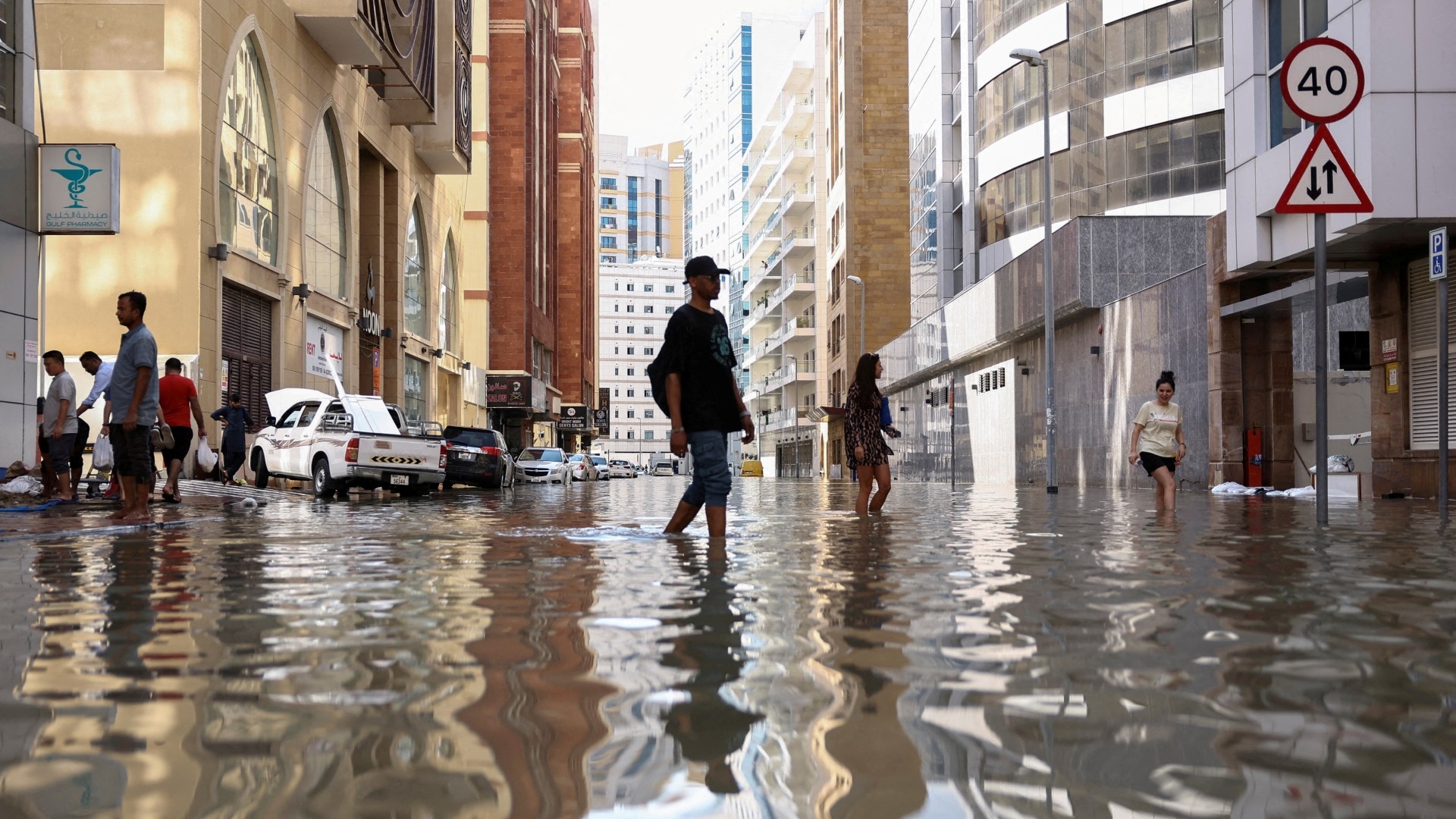'Dubai's Fyre Festival': Crypto investors caught in chaotic UAE floods

“This Lamborghini is swimming bro,” said influencer Crypto Bitlord, as his sports car battled against heavy rain in Dubai on Tuesday.
He was among hundreds of crypto traders and enthusiasts who descended upon the United Arab Emirates city this week for two cryptocurrency conferences: Blockchain Life and Token2049.
Attendees had probably expected the dry, arid conditions synonymous with the Gulf desert. Instead they were met by some of the heaviest rain in Emirati history.
Along the border with Oman, 254mm of rain was recorded in less than 24 hours earlier this week - the most since records began in 1949.
Many traders and influencers were left unimpressed by the ordeal.
Stay informed with MEE's newsletters
Sign up to get the latest alerts, insights and analysis, starting with Turkey Unpacked
“Dubai is the worst city I’ve ever been to and I’m never willingly coming here again,” wrote one trader.
In a lengthy post, crypto influencer ‘doitbigchicago’ said the emergency door on his plane into Dubai was “shaking”, as the aircraft landed in “3 feet of water”. He said his suitcase was “floating down the runway”.
He added that he attempted to live-stream the conditions in Dubai, until eight police officers were “trying to arrest me for live-streaming in public”.
Middle East Eye couldn’t independently verify the claims.
Another crypto investor and podcaster wrote: “This is the most dogshit thing I’ve ever seen… 0 police, 0 firefighters, 0 taxis - just yoloing the sea with a rental car after flight getting delayed by six hours.”
Some conference attendees who couldn’t get a ride to and from the airport were ready to go to extreme financial lengths.
“Willing to pay $500-1000 USD for a ride from DXB to Palm Jumeirah,” wrote Bitcoin trader "Faded".
Another investor, known as "the Watch King", also offered $1,000 to anyone who could take him to the airport.
There were significant delays and disruptions at Dubai International Airport - the world's busiest for international traffic. Clips online showed planes taxiing across a flooded runway.
There appeared to be little online sympathy for the crypto aficionados caught up in the chaos.
Some likened the event to Fyre Festival, a fraudulent luxury music event in April 2017.
“Looks like all the crypto bros are getting liquidated in Dubai. Quite literally,” joked one bitcoin analyst.
“The collective karma of all of these sh*tfluencers is so bad that when they all congregate in the middle of the desert, it ACTUALLY floods,” said another user.
Some thought the floods were a punishment from a higher power.
“You cannot tell me God isn’t real when a bunch of Crypto twitters finest go to Dubai only to be met with a biblical flood,” wrote one X user.
It wasn’t the first time crypto and bitcoin investors had been caught up in adverse weather conditions: Korean Blockchain Week was hit by heavy rains in 2022, while an NFT event in New York City coincided with an earthquake earlier this month.
Cloud seeding and climate change
Though initially disrupted, both Dubai crypto conferences went ahead and many attendees made it to the event.
Earlier this week, analysts told MEE that climate change, infrastructure, the region's geography, and cloud seeding could exacerbate flooding in the Gulf region.
Mohammed Mahmoud, director of the climate and water programme at the Middle East Institute, said climate change “is an absolute driver of extreme weather”.
He told MEE: “Though we mostly associate climate change with hotter temperatures, warming in coastal areas promotes severe rainfall and storms.
"Such is the case for the Gulf, where those surrounding warmer waters (close to the equator) help to generate storms that produce intense rainfall that cause these devastating flooding events.”
Justin Dargin, a researcher at Oxford University specialising in climate and the Middle East, said infrastructural and geographic limitations also contributed.
“The region's arid climate, featuring sudden downpours combined with mountainous areas and desert valleys, creates conditions conducive to flash floods,” he said, adding that limited drainage systems also worsened the impact.
To deal with water security issues, the UAE has since 2002 carried out cloud seeding: a weather modification procedure that involves implanting chemicals into the atmosphere to induce rainfall.
“Cloud seeding likely contributed to the severity,” said Dargin. “However, the UAE's recent history of devastating flash floods, like those in 2020 and 2022, shows that recent bouts of heavy rainfall are the baseline of the increasing frequency of extreme rainfall events driven by climate change.”
He said that cloud seeding could exacerbate such weather patterns and lead to even more severe flooding in the future “if not undertaken judiciously”.
The UAE government's National Center of Meteorology taskforce denied that cloud seeding had taken place in the run-up to this week's storms.
Middle East Eye delivers independent and unrivalled coverage and analysis of the Middle East, North Africa and beyond. To learn more about republishing this content and the associated fees, please fill out this form. More about MEE can be found here.





_1.jpg.webp?itok=gebEVFRV)